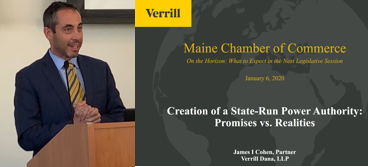Jim Cohen Addresses Maine Chamber Symposium About Risks of Public Power

On January 6, 2020, longtime Verrill partner and energy lawyer Jim Cohen appeared at a legislative symposium hosted by the Maine Chamber of Commerce and spoke on the topic, “Creation of a State-Run Power Authority: Promises vs. Realities.”
Cohen’s presentation outlined the substantial risks associated with Maine LD 1646, a legislative proposal pending before the Maine State Legislature directing the State of Maine to take-over Central Maine Power and Emera Maine so that the Maine State government would be responsible for owning and operating the majority of Maine’s electric grid. A copy of the presentation is available here.
In his presentation, Cohen provided a wide range of information regarding the history of public power in America, including a recent trend toward privatizing electric utilities – including publicly-owned Swan’s Island Electric Cooperative in Maine whose customers saw their rates decline in 2017 when the utility became part of Emera Maine.
Cohen also noted that the State of Nebraska is the only state in America that is predominantly “public power,” and most of the electric utilities in that state were started in the Depression era as publicly-owned rural electric cooperatives. If Maine were to take over its privately-owned utilities, it would be the first state in the nation to take over private utilities comprising the majority of the state’s customers. Cohen noted that such a policy would represent one of the most dramatic legislative actions by the Maine Legislature in 50 years, were it to pass.
Cohen also talked about the cost to the State in order to take over CMP and Emera Maine. Based on fair market value, he estimated that the cost to Maine electric customers would be $7-9 billion, which would need to be paid for in electric rates. Moreover, he estimated that litigation related to the takeover was highly likely given the experiences of other municipalities seeking to take over their local electric companies; such litigation would likely take many years and cost the State tens of millions of dollars in attorneys’ fees. Finally, Cohen noted that CMP and Emera Maine are two of the State’s largest taxpayers, and making them public risks a loss of $35-40 million in state taxes and $70 million in local property taxes – revenue that would need to be made up by other taxpayers.
Cohen’s presentation also provided information comparing Maine with Nebraska, including the fact that Nebraska was rated well below Maine with regard to energy efficiency and grid modernization. He also provided slides showing that 75% of energy produced in Maine was renewable, whereas the predominant form of energy in Nebraska was coal – despite Nebraska having abundant wind resources.
Finally, Cohen noted that, according to the U.S. Energy Information Administration, privately-owned electric utilities typically have better reliability than publicly-owned electric cooperatives. Moreover, notwithstanding Maine being the most forested state in the nation with nearly 3,000 miles of coastline, privately-owned Central Maine Power had a better reliability track record in the years before 2017 than most of the major consumer-owned utilities in Nebraska, where there are few trees and no coastline.
Looking ahead, the Maine Public Utilities Commission (PUC) is developing a report on government-owned power, which is due back to the Legislature by February 15. As part of the development of its report, the PUC opened a public docket and sought comments from the public. These comments are available here as part of PUC Docket No. 2019-00280.
The Maine Legislature is expected to take up the subject of government-owned power in February.













